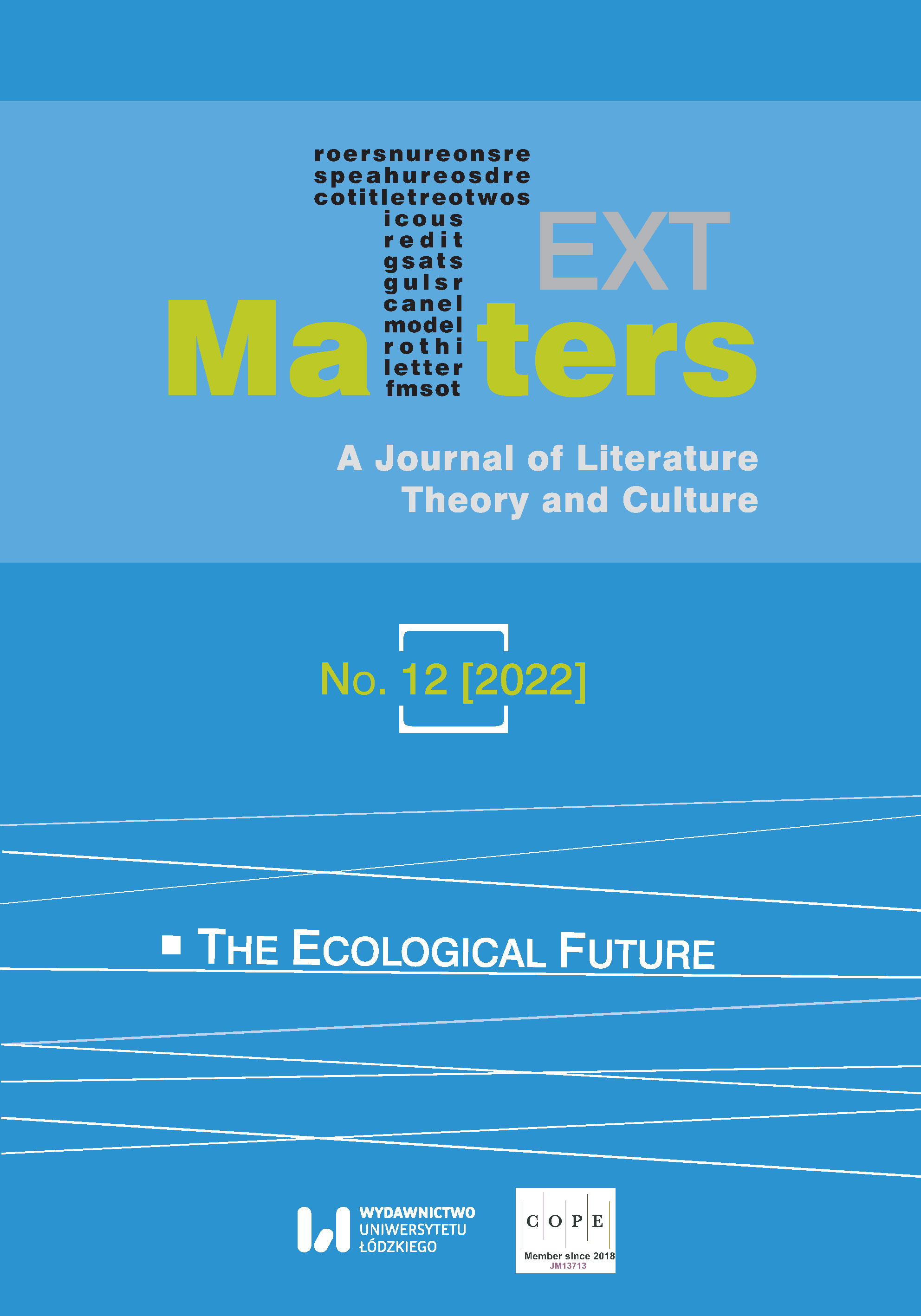“Enlightenment Is a Shared Enterprise”: Tree Ecosystems and the Legacy of Modernity in Richard Powers’s The Overstory
DOI:
https://doi.org/10.18778/2083-2931.12.17Keywords:
contemporary American environmental fiction, Richard Powers, ecology, modernity, Enlightenment, tree ecosystem, BuddhismAbstract
In Richard Powers’s Pulitzer Prize-winning The Overstory (2018) the theme of the novel is the forest ecosystem, with a special emphasis placed on trees, upon whose developmental model the processes of (organic and industrial) growth are scrutinized in this novel. This article examines tree-human assemblages in detail to see how they exchange their material agency and how they relate to the e/Enlightenment project. The essay also explores Powers’s novel to examine how Buddhist values of spiritual enlightenment are contextualized within European Enlightenment and how decentred humanity finds its place among other non-human beings. Apart from fictitious characters from The Overstory, the article draws upon the research of real-life scientists who inspired the creation of Powers’s protagonists: Prof. Simard and Dr. Beresford-Kroeger, along with the work of anthropologist Anna Tsing. In addition, eco-solutions concerning the tree ecosystem (i.e. bio-planning and the seed banks) coming from the scientific field and the field of literature (Powers) are examined to see if today’s progressive ideas can function in the world of the—still, to a large extent, “regressive”—structures of modernity’s legacy. I conclude by arguing that the novel shows that the Enlightenment project is not compatible with the well-being and long-term survival of both humans and non-human beings.
Downloads
References
Bennett, Jane. Vibrant Matter: A Political Ecology of Things. Duke UP, 2010. https://doi.org/10.1215/9780822391623
Google Scholar
DOI: https://doi.org/10.2307/j.ctv111jh6w
Beresford-Kroeger, Diana. The Global Forest. Viking, 2010.
Google Scholar
Beresford-Kroeger, Diana. To Speak for the Trees: My Life’s Journey from Ancient Celtic Wisdom to a Healing Vision of the Forest. Timber, 2019.
Google Scholar
Berry, Michael. “In His New Novel, Richard Powers Writes From a Tree’s Point of View.” Sierra: The Magazine of the Sierra Book Club, 3 Apr. 2018, https://www.sierraclub.org/sierra/his-new-novel-richard-powers-writes-tree-s-point-view accessed 8 June 2022.
Google Scholar
Boller, Alessandra. “In Need of New Narratives: Feminist Ustopian Fiction Challenging the Anthropocene.” The Postworld In-Between Utopia and Dystopia: Intersectional, Feminist, and Non-Binary Approaches in 21st-Century Speculative Literature and Culture, edited by Katarzyna Ostalska and Tomasz Fisiak, Routledge, 2021, pp. 17–32. https://doi.org/10.4324/9781003082958-3
Google Scholar
DOI: https://doi.org/10.4324/9781003082958-3
Bonneuil, Christophe. “The Geological Turn: Narratives of the Anthropocene.” The Anthropocene and the Global Environmental Crisis: Rethinking Modernity in a New Epoch, edited by Clive Hamilton, Christophe Bonneuil and Francois Gemenne, Routledge, 2015, pp. 17–31. https://doi.org/10.4324/9781315743424-2
Google Scholar
DOI: https://doi.org/10.4324/9781315743424-2
Braidotti, Rosi. The Posthuman. Polity, 2013.
Google Scholar
Cohen, Richard S. Beyond Enlightenment: Buddhism, Religion, Modernity. Routledge, 2006. https://doi.org/10.4324/9780203098783
Google Scholar
DOI: https://doi.org/10.4324/9780203098783
Crist, Eileen. “On the Poverty of Nomenclature.” Anthropocene or Capitalocene? Nature, History, and the Crisis of Capitalism, edited by Jason W. Moore, Kairos, 2016, pp. 14–33.
Google Scholar
“Freeing Oneself from Suffering and Its Causes: Four Stages of Enlightenment.” Buddhist Spirituality, https://buddhist-spirituality.com/suffering-its-reality/devotion-in-buddhism accessed 8 Mar. 2022.
Google Scholar
Hamilton, Clive. “Human Destiny in the Anthropocene.” The Anthropocene and the Global Environmental Crisis: Rethinking Modernity in a New Epoch, edited by Clive Hamilton, Christophe Bonneuil and Francois Gemenne, Routledge, 2015, pp. 32–43. https://doi.org/10.4324/9781315743424-3
Google Scholar
DOI: https://doi.org/10.4324/9781315743424-3
Hamilton, Clive, Christophe Bonneuil, and Francois Gemenne. “Thinking the Anthropocene.” The Anthropocene and the Global Environmental Crisis: Rethinking Modernity in a New Epoch, edited by Clive Hamilton, Christophe Bonneuil and Francois Gemenne, Routledge, 2015, pp. 1–13. https://doi.org/10.4324/9781315743424-1
Google Scholar
DOI: https://doi.org/10.4324/9781315743424-1
Harman, Graham. Prince of Networks: Bruno Latour and Metaphysics. re.press, 2009.
Google Scholar
Hayles, N. Katherine. How We Became Posthuman: Virtual Bodies in Cybernetics, Literature and Informatics. U of Chicago P, 1996.
Google Scholar
Horkheimer, Max, and Theodor W. Adorno. Dialectic of Enlightenments: Philosophical Fragments. Edited by Gunzelin Schmid Noerr. Translated by Edmund Jephcott. Stanford UP, 2002.
Google Scholar
Hornborg, Alf. “The Political Ecology of the Technocene: Uncovering Ecologically Unequal Exchange in the World-System.” The Anthropocene and the Global Environmental Crisis: Rethinking Modernity in a New Epoch, edited by Clive Hamilton, Christophe Bonneuil and Francois Gemenne, Routledge, 2015, pp. 57–69. https://doi.org/10.4324/9781315743424-5
Google Scholar
DOI: https://doi.org/10.4324/9781315743424-5
Latour, Bruno. Reassembling the Social: An Introduction to Actor-Network Theory. Oxford UP, 2005.
Google Scholar
Latour, Bruno. We Have Never Been Modern. Translated by Catherine Porter. Harvard UP, 1993.
Google Scholar
Margulis, Lynn, and Dorion Sagan. Microcosmos: Four Billion Years of Microbial Evolution. Foreword by Lewis Thomas. U of California P, 1997.
Google Scholar
McBrien, Justin. “Accumulation by Extinction: Planetary Catastrophism in the Necrocene.” Anthropocene or Capitalocene? Nature, History, and the Crisis of Capitalism, edited by Jason W. Moore, Kairos, 2016, pp. 116–37.
Google Scholar
Morton, Timothy. Ecology Without Nature: Rethinking Environmental Aesthetics. Harvard UP, 2007.
Google Scholar
Pinker, Steven. “Enlightenment Environmentalism: The Case for Ecomodernism.” Breakthrough Journal, no. 8, Winter 2018, https://thebreakthrough.org/journal/no-8-winter-2018/enlightenment-environmentalism accessed 10 Dec. 2020.
Google Scholar
Powers, Richard. The Overstory. Vintage, 2018.
Google Scholar
Simard, Suzanne. Finding the Mother Tree: Uncovering the Wisdom and Intelligence of the Forest. Penguin, 2021. E-book.
Google Scholar
Tsing, Anna Lowenhaupt. The Mushroom at the End of the World: On the Possibility of Life in Capitalist Ruins. Princeton UP, 2015. https://doi.org/10.1515/9781400873548
Google Scholar
DOI: https://doi.org/10.1515/9781400873548
Wright, Dale S. What Is Buddhist Enlightenment? Oxford UP, 2016. https://doi.org/10.1093/acprof:oso/9780190622596.001.0001
Google Scholar
DOI: https://doi.org/10.1093/acprof:oso/9780190622596.001.0001
Wohlleben, Peter. The Hidden Life of Trees: What They Feel, How They Communicate. Discoveries from a Secret World. Foreword by Tim Flannery. Translated by Jane Billinghurst. David Suzuki Institute/Greystone, 2015.
Google Scholar
Published
How to Cite
Issue
Section
License

This work is licensed under a Creative Commons Attribution-NonCommercial-NoDerivatives 4.0 International License.













